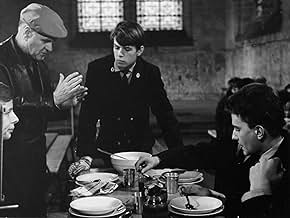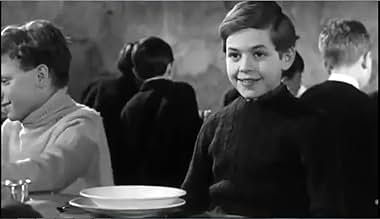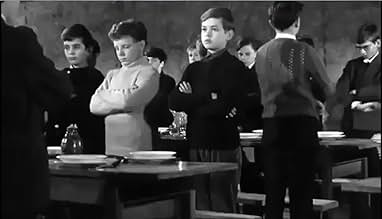IMDb RATING
7.7/10
3.2K
YOUR RATING
A tale of the tender relationship between a 12-year-old boy and the upperclassman who is the object of his desire in the rigid atmosphere of their Jesuit-run school.A tale of the tender relationship between a 12-year-old boy and the upperclassman who is the object of his desire in the rigid atmosphere of their Jesuit-run school.A tale of the tender relationship between a 12-year-old boy and the upperclassman who is the object of his desire in the rigid atmosphere of their Jesuit-run school.
- Director
- Writers
- Stars
- Awards
- 1 nomination total
Gérard Chambre
- André Ferron
- (uncredited)
Henri Coutet
- L'employé de l'institution
- (uncredited)
Dominique Diamant
- Maurice Motier
- (uncredited)
Alain-Philippe Malagnac
- Un élève
- (uncredited)
Bernard Musson
- Le père enseignant
- (uncredited)
Colette Régis
- La religieuse
- (uncredited)
- Director
- Writers
- All cast & crew
- Production, box office & more at IMDbPro
Featured reviews
I had read the novel (in English translation, one of two which have been published?) several years before seeing the film. It is, I think, characteristically French: carefully descriptive, observant, objective, restrained, but also subtly hypnotic. I read and read, and almost put the book down halfway through because it didn't seem to be going anywhere or making any impact on me. Then, all of a sudden, I was in tears-- but I still couldn't say exactly what had hit me other than everything. It was as though the pieces of a puzzle suddenly fell into place.
The film is faithful to the spirit as well as the letter of the book. Both were remarkably bold gestures for their time, describing an earlier generation and environment which were even more strait-laced. Like me, you may fall gently under its spell, then-- wham! Sheer magic.
The film is faithful to the spirit as well as the letter of the book. Both were remarkably bold gestures for their time, describing an earlier generation and environment which were even more strait-laced. Like me, you may fall gently under its spell, then-- wham! Sheer magic.
French cinema has always been, if not the most profound and analytic in the world, indeed, the one that sets the benchmark. In this beautifully shot film, Delanoy tackles a difficult subject matter (for our days) that wasn't so then. When I saw Les Amities Particulieres for the first time, I simply couldn't realise how important it was. Now, after many years, I find it much more interesting than it would have been in the sixties. Many others have already written about the story. I will delve into a different approach: today's reality, at the beginning of the 21st Century.
The strength of our mediated world has increased exponentially and it will keep on growing. The way we look at our world today is consistently chiseled by the way information is provided, dissected, manipulated and delivered. We just consume it. With it, the apocalyptic view on pedophilia that, by the way, means affinity, love, for boys has been transformed completely.
Maybe we're more than insane today than in the 40's or the 70's, but by then people were not scared at all by this kind of love, even when it was clearly seen as sin if sexuality was involved. For us, pedophile means stalker, assassin, assailant, or, as the media loves to call them: molester.
It's a good idea to watch this film with an open mind. What happens has happened for centuries and will happen ever after, until the human race disappears. May this words imply that I defend pedophiles? Yes. I can't defend a criminal, but I can defend someone who loves another human being and is loved in response. Georges loves Alexandre and Alexandre is absolutely in love with him, despite the age gap (at that age, the gap is even more pronounced). Alexandre makes Georges swear his love for ever, his "special friendship", and writes him touching letters that only lovers can write. They simply can't help not loving each other, despite of the many obstacles in their way.
In today's perspective, Georges is a pedophile, a stalker, a child molester who would never, ever molest a child... a stalker that is stalked by his prey because... he loves him. This bond grows so strong that is shared with close friends that encourage this relationship.
What would the media say about something like this TODAY???? We all know the answer.
This film can teach, too, a lot in cinematographic techniques. The use of the camera is unusual for its time. Maybe one of the most daring movements is when Georges arrives in one of the first scenes of the film. The unique way of depicting the corridors in the cloister is another "first", when the steadycam wasn't even in a dream.
And, story-wise, we have to credit this film with one of the most powerful endings in cinema: after the "Fin" frames we discover the very last testament of Georges unread letter to Alexandre, which ends with the word "amour". All in all, a must-see.
If you want to consider further what I said before (I know it will be hard for many people to swallow) I recommend watching "Wild Tigers I Have Known", a 2006 film made by Cam Archer, 26. It draws a similar scenario assuming life as it is now. I caution you that this film is very experimental (underline very), so it may be confusing and without a clear conclusion. That, is yours to make.
The strength of our mediated world has increased exponentially and it will keep on growing. The way we look at our world today is consistently chiseled by the way information is provided, dissected, manipulated and delivered. We just consume it. With it, the apocalyptic view on pedophilia that, by the way, means affinity, love, for boys has been transformed completely.
Maybe we're more than insane today than in the 40's or the 70's, but by then people were not scared at all by this kind of love, even when it was clearly seen as sin if sexuality was involved. For us, pedophile means stalker, assassin, assailant, or, as the media loves to call them: molester.
It's a good idea to watch this film with an open mind. What happens has happened for centuries and will happen ever after, until the human race disappears. May this words imply that I defend pedophiles? Yes. I can't defend a criminal, but I can defend someone who loves another human being and is loved in response. Georges loves Alexandre and Alexandre is absolutely in love with him, despite the age gap (at that age, the gap is even more pronounced). Alexandre makes Georges swear his love for ever, his "special friendship", and writes him touching letters that only lovers can write. They simply can't help not loving each other, despite of the many obstacles in their way.
In today's perspective, Georges is a pedophile, a stalker, a child molester who would never, ever molest a child... a stalker that is stalked by his prey because... he loves him. This bond grows so strong that is shared with close friends that encourage this relationship.
What would the media say about something like this TODAY???? We all know the answer.
This film can teach, too, a lot in cinematographic techniques. The use of the camera is unusual for its time. Maybe one of the most daring movements is when Georges arrives in one of the first scenes of the film. The unique way of depicting the corridors in the cloister is another "first", when the steadycam wasn't even in a dream.
And, story-wise, we have to credit this film with one of the most powerful endings in cinema: after the "Fin" frames we discover the very last testament of Georges unread letter to Alexandre, which ends with the word "amour". All in all, a must-see.
If you want to consider further what I said before (I know it will be hard for many people to swallow) I recommend watching "Wild Tigers I Have Known", a 2006 film made by Cam Archer, 26. It draws a similar scenario assuming life as it is now. I caution you that this film is very experimental (underline very), so it may be confusing and without a clear conclusion. That, is yours to make.
Another Delannoy 's film which needs restoring to favor in its native France where the director's reputation,because of the stupidity of the fusty Cahiers du Cinema,has definitely sunk.Delannoy,almost a centenarian,worked till 1995 ,but "Les Amitiés Particulières" is his last good movie.I'm happy to notice that there's not one single negative comment on it.Proof positive that non-French are better at judging French Films.Maybe the rating is currently a bit too high (8,9),but if it can help Delannoy get out of oblivion where he has fallen,so much the better.
Delannoy ,transferring a novel which was very popular in the sixties,depicts a world which no longer exists.Lines warn us before the cast and credits:times have changed,iron discipline is now a thing of the past,but there are things which never change: the first emotions of the adolescence.
Some people wrote there was a "gay interest" in the movie.I do not think it is so.If Georges falls for Alexandre ,it is because he lives in a man's man's man's world.Except for the scene of the prize giving day,there are no women,a fortiori girls in the film.And this is a world where religion reigns everywhere,a world where young aristocrats or wealthy bourgeois study under the priests' extremely watchful eye.
Best performance comes from Didier Haudepin,a wunderkind (like Brigitte Fossey in "Jeux Interdits" ) who grew up to become a director ("Paco l'Infallible " starring the late Patrick Dewaere) and an actor ("Les Assassins de l'Ordre" one of Marcel Carné's last efforts) but without any real success.When he appears ,holding the lamb,it is a transparent metaphor of purity.Alexandre's and Georges's love will remain pure and platonic .Their relationship reminds me of that between Le Petit Prince and the aviator in Saint-Exupery's famous novel.Their meetings in the greenhouse are extremely well filmed .That was not such an easy subject for the sixties and the pejorative word "academic" with which the highbrows often label Delannoy does not make any sense here.
Delannoy ,transferring a novel which was very popular in the sixties,depicts a world which no longer exists.Lines warn us before the cast and credits:times have changed,iron discipline is now a thing of the past,but there are things which never change: the first emotions of the adolescence.
Some people wrote there was a "gay interest" in the movie.I do not think it is so.If Georges falls for Alexandre ,it is because he lives in a man's man's man's world.Except for the scene of the prize giving day,there are no women,a fortiori girls in the film.And this is a world where religion reigns everywhere,a world where young aristocrats or wealthy bourgeois study under the priests' extremely watchful eye.
Best performance comes from Didier Haudepin,a wunderkind (like Brigitte Fossey in "Jeux Interdits" ) who grew up to become a director ("Paco l'Infallible " starring the late Patrick Dewaere) and an actor ("Les Assassins de l'Ordre" one of Marcel Carné's last efforts) but without any real success.When he appears ,holding the lamb,it is a transparent metaphor of purity.Alexandre's and Georges's love will remain pure and platonic .Their relationship reminds me of that between Le Petit Prince and the aviator in Saint-Exupery's famous novel.Their meetings in the greenhouse are extremely well filmed .That was not such an easy subject for the sixties and the pejorative word "academic" with which the highbrows often label Delannoy does not make any sense here.
10ricbigi
I have long wished to see this film and finally a DVD of it has been made available, so I watched it with enormous curiosity. I must say I am very much touched by LES AMITIÉS PARTICULIÈRES, for everything rings absolutely true in this film. The screenplay by Jean Aurenche and Pierre Bost is perfection itself, rending Peyrefitte's autobiographical novel totally cinematic, visually striking and emotionally devastating. The acting by the two leading men is beyond anything I could have expected from such young performers. Didier Haudepin gives the best performance by a child actor I have ever seen in fifty-some years of film-going, standing alongside the likes of Patty Duke in THE MIRACLE WORKER, Brigitte Fossey in LES JEUX INTERDITS and Enzo Staiola in LADRI DI BICICLETTE. The supporting cast is equally to be praised, particularly the great Michel Bouquet. Frankly, Jean Delannoy deserves ample credit for having brought to the screen a film of such beauty and flawless artistry. I believe François Truffaut has never done anything that even approaches such a high level of film-making.
At first I did not think that the movie will be interesting. But I soon changed my opinion. The fact that the movie is in black and white makes it even more appealing than if it was in colour. The action takes place in a boarding school located in France. Actually the scenes from the dinning room reminded me of the movies for Harry Potter.
The main characters are Georges de Sarre 16 years old student and the young Alexandre (age 12) who is a student at the same school. Their friendship is really beautiful and heart touching. It sure brought some old memories too. There is a lot of poetry in this movie it seems that I am getting hocked to poetry- again! Few years ago there was a girl who was sending me sonnets of Shakespeare. I even tried to write some poems myself. I still haven't finished watching the movie it turned out to be on two CDs and I only got one of them, but will get the second one soon- then I will complete this review.
I have finished watching the movie and its ending made me sad sad and disgust. Disgust that there are such people who refuse to accept that a true, special friendship can exist and interfere to hurt everyone, but their pity selves. And do I know of such people because they are not only shown in the movies you know they lurk amongst us trying to make the rest believe and thing what they do such people really disgust me .
Les amitiés particulières is based on 1943 novel by French writer Roger Peyrefitte.
The main characters are Georges de Sarre 16 years old student and the young Alexandre (age 12) who is a student at the same school. Their friendship is really beautiful and heart touching. It sure brought some old memories too. There is a lot of poetry in this movie it seems that I am getting hocked to poetry- again! Few years ago there was a girl who was sending me sonnets of Shakespeare. I even tried to write some poems myself. I still haven't finished watching the movie it turned out to be on two CDs and I only got one of them, but will get the second one soon- then I will complete this review.
I have finished watching the movie and its ending made me sad sad and disgust. Disgust that there are such people who refuse to accept that a true, special friendship can exist and interfere to hurt everyone, but their pity selves. And do I know of such people because they are not only shown in the movies you know they lurk amongst us trying to make the rest believe and thing what they do such people really disgust me .
Les amitiés particulières is based on 1943 novel by French writer Roger Peyrefitte.
Did you know
- TriviaIn the source novel, Georges de Sarre is 14 years old and Alexandre Motier is 12 years old. However, the year in which the film was made, Francis Lacombrade (1942-) was 22 years old and Didier Haudepin (1951-) was 13 years old.
- GoofsWhen Lucien looks at his watch we can see that the time is 6:15 but he reads it as 10:35.
- How long is This Special Friendship?Powered by Alexa
Details
- Release date
- Country of origin
- Language
- Also known as
- This Special Friendship
- Filming locations
- Abbaye de Royaumont, Asnières-sur-Oise, Val d'Oise, France(jesuit college where the story takes place)
- Production companies
- See more company credits at IMDbPro
- Runtime1 hour 40 minutes
- Color
- Sound mix
- Aspect ratio
- 1.78 : 1
Contribute to this page
Suggest an edit or add missing content

Top Gap
By what name was Les amitiés particulières (1964) officially released in India in English?
Answer




















